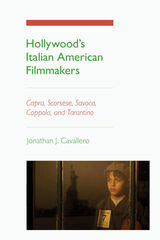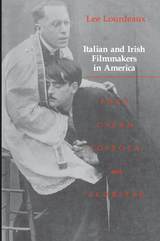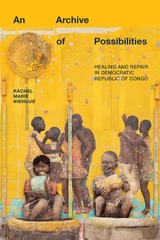2 books about Italian Americans in motion pictures

Hollywood's Italian American Filmmakers
Capra, Scorsese, Savoca, Coppola, and Tarantino
Jonathan J. Cavallero
University of Illinois Press, 2011
Hollywood's Italian American Filmmakers explores the different ways in which Italian American directors from the 1920s to the present have responded to their ethnicity. While some directors have used film to declare their ethnic roots and create an Italian American "imagined community," others have ignored or even denied their background. Jonathan J. Cavallero examines the films of Frank Capra, Martin Scorsese, Nancy Savoca, Francis Ford Coppola, and Quentin Tarantino with a focus on what the films reveal about each director's view on Italian American identities. Whereas Capra's films highlight similarities between immigrant characters and WASP Americans, Scorsese accepts his ethnic heritage but also sees it as confining. Similarly, many of Coppola's films provide a nostalgic treatment of Italian American identity, but with little criticism of the culture's more negative aspects. And while Savoca's movies reveal her artful ability to recognize how ethnic, gender, and class identities overlap, Tarantino's films exhibit a playfully postmodern engagement with Italian American ethnicity.
Cavallero's exploration of the films of Capra, Scorsese, Savoca, Coppola, and Tarantino demonstrates how immigrant Italians fought prejudice, how later generations positioned themselves in relation to their predecessors, and how the American cinema, usually seen as a cultural institution that works to assimilate, has also served as a forum where assimilation was resisted.
[more]

Italian Irish Filmmakers
Lee Lourdeaux
Temple University Press, 1993
"This penetrating study examines how these filmmakers confronted their cultural heritage and used it as a counterpoint to their depiction of mainstream America."
--American Cinematographer
In this unique film history, Lee Lourdeaux traces the impact of Irish and Italian cultures on four major American directors and their work. Defining the core values and tensions within each culture, and especially focusing on the influence of American Catholicism, he presents John Ford, Frank Capra, Francis Coppola, and Martin Scorsese as ethnic Americans and film artists. Lourdeaux shows each filmmaker on set with writers and actors, learning to bypass stereotypes in order to develop a shrewd reciprocal assimilation between his ethnic background and Anglo America.
Beginning with D. W. Griffith's depiction of Irish and Italian immigrants, the author discusses Hollywood's stereotypical portrayals of ethnic priests, cops, politicians, and gangsters, as well as their surface acculturation in the movies of the 1920s. By the decade's end, John Ford was using all-American stories to embody the basic myths and tensions of Irish-American life. In his later westerns and foreign films, he tried to understand both Irish political strife and the key figures of Irish liturgy. Frank Capra pitted Italian family values against the Anglo success ethic, turning out social comedies about oppressed little people. Several decades later, Martin Scorsese and Francis Coppola were highly critical of their religio-ethnic heritage, though they gradually discovered that to outline its weaknesses, like the blind pursuit of success, was to fashion a critical mirror of mainstream America. Lourdeaux discusses a number of recent films by Coppola and by Scorsese that have not yet been analyzed in any book. And, in the chapter on Scorsese, a personal interview with the director reveals how his ethnic childhood shaped his work in film.
Examining the conflicts within American culture, Lourdeaux shows how the filmmakers themselves had to confront the self-destructive aspects of their ethnic background, not only to accommodate WASP audiences but to better understand their own heritage. He also observes that ethnicity is a strong draw at the box office, as in The Godfather, because it creates a sense of the Other who can both be admired and at the same time ridiculed. Illustrated with scenes of the movies discussed, this fascinating film history tells how four of America's most famous filmmakers assimilated their ethnic backgrounds on set and on screen.
"Mr. Lourdeaux walks a tricky path in analyzing the films of each [director]: avoiding the trap of excessively detailing their lives and many films, while steering clear of ethnic stereotyping. Those interested in ethnic influences on outstanding persons or in the production of films by four of the best will find the book enjoyable."
--The Baltimore Sun
"This is an invaluable book because it arouses critical awareness of the ethnicity underlying many Hollywood movies that might otherwise appear merely to represent American archetypes."
--Journal of American Studies
"A valuable addition to the literature on ethnic identity in film. The insights Lourdeaux offers into major figures like Griffith, Ford, Capra, Coppola, and Scorsese contribute significantly to our understanding of their films."
--Virginia Wright Wexman, University of Illinois at Chicago
"For a number of years now, church historians have been giving us an account of American Catholicism that is much richer and more varied than the older institutional accounts of the Catholic Church ever let on. In this comprehensive and insightful study, Lee Lourdeaux shows us how much the ethnic movies of directors like Ford and Capra, Coppola and Scorsese have to teach us as well about Irish- and Italian-Catholic mores and instincts."
--John B. Breslin, S.J., Director
"A wonderfully sensitive, intelligent study of the complex issue of how the Catholic imagination works in the creative personalities of those raised in the Catholic heritage."
--Andrew M. Greeley
[more]
READERS
Browse our collection.
PUBLISHERS
See BiblioVault's publisher services.
STUDENT SERVICES
Files for college accessibility offices.
UChicago Accessibility Resources
home | accessibility | search | about | contact us
BiblioVault ® 2001 - 2024
The University of Chicago Press









